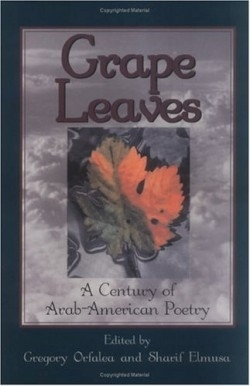Grape Leaves
A Century of Arab-American Poetry
Grape leaves are a staple of the Arab diet, so too are words. The connection is rightfully made in this collection of Arab-American poetry that is powerful through both the beauty of its art and its thoroughness.
It includes the works of twenty poets beginning with the first major wave of immigrants in the late nineteenth century and continuing through the 1980s. Some poems, such as those by Elia Abu Madi, are translated for the first time here. Both male and female poets offer their perspective in this anthology. Readers are given a chance to get to know some lesser known poets such as Mikhail Naimy and young poets such as Naomi Shihab Nye as well as revisit the works of the most well known of Arab poets, Kahlil Gibran.
This anthology offers many advantages. Biographies and photographs accompany each poet’s collection, providing a wonderful backdrop for the poems themselves. They help readers to better understand the authors and their inspirations. Another helpful aspect is that the poems generally are presented chronologically. The author’s birthdate dictates the order of the book, from oldest to youngest. It is an important point since the writing shows a definite shift among the more recent poems. There is a frequent cord of frustration in their words. It sometimes is a generational conflict, old versus new; sometimes it is an inner conflict as in this closing passage by Fawaz Turki to “Being a Good Americani”: when the moment / is neither here nor there, / which is a safe time to think / about Palestine and olive trees, / and I pity myself / and the place I came from.”
Through lyrical wording, profound emotion and cultural insight, this collection offers readers both powerful poetry and a unique look at Arab-Americans’ journey over the last century.
Reviewed by
Marjory Raymer
Disclosure: This article is not an endorsement, but a review. The publisher of this book provided free copies of the book to have their book reviewed by a professional reviewer. No fee was paid by the publisher for this review. Foreword Reviews only recommends books that we love. Foreword Magazine, Inc. is disclosing this in accordance with the Federal Trade Commission’s 16 CFR, Part 255.

